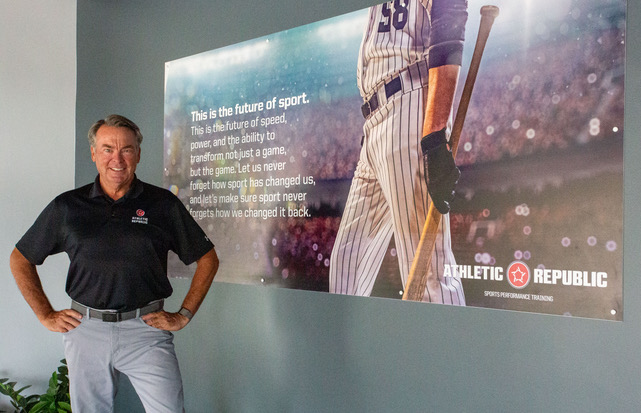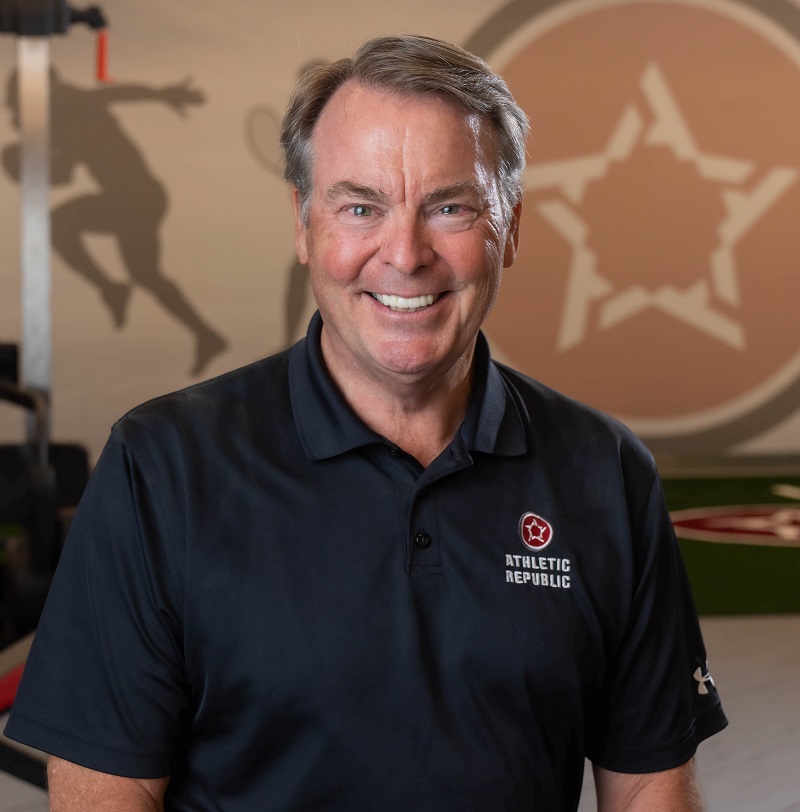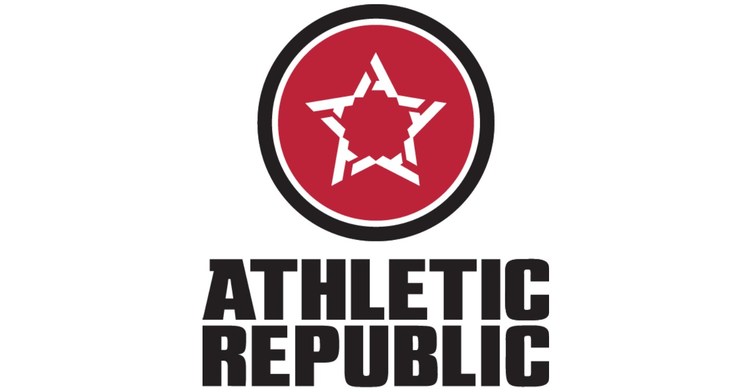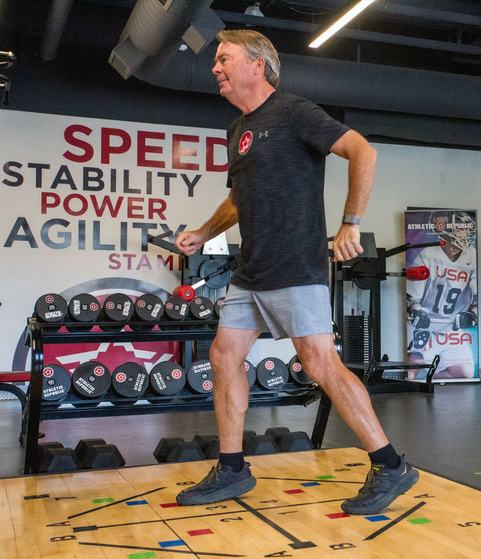CEO Corner: Charlie Graves Leans into Testing, Teaching, Training, & Tracking for Today & Tomorrow’s Athletes

Athletic Republic CEO Charlie Graves has what he calls an “eclectic” background that’s served him very well into his present role. Having added a fourth element to founder John Frappier’s methodology for the company, Graves describes his journey to steering Athletic Republic into the future to Athletech News.
When asked how he would describe Athletic Republic to any person with an inquisitive mind, CEO Charlie Graves is quick to bring up its focus on “the performance side of sports — speed, power, agility, strength, and stamina.” However, the company is more than that, along with its other attribute of training youth, team, college and professional athletes to help improve their sports performances. Athletic Republic encourages and cultivates confidence, which breeds competence and achievement. Statistics proving sports’ capacity in doing all of the above have been well-documented over the years. But, late founder John Frappier’s unique “Test, Teach, and Train” modus operandi, along with Graves’ fourth “Track” key addition and state-of-the-art performance software technology, has become the basis of Athletic Republic’s successful training model for the past 30+ years.
Athletech News was able to pull Graves away from his pressing schedule to talk more about his exceptional career before and during success as the CEO of Athletic Republic. His journey, which includes becoming an Olympic-level swimmer and work in real estate, eventually led him to fitness business leader to helping athletes achieve their goals. Here’s more of Charlie Graves’ story, his thoughts on what makes a good CEO and the moment he knew Athletic Republic would become an excellent business endeavor.
Athletech News (ATN): Tell us about your background.

Charlie Graves: I’ve always been an athlete, both in mind and body. I think as a competitor, and CEO, that mindset is important. I was a swimmer in college, got caught in the Olympic boycott going into the [19]80 Games, and didn’t get to fulfill my dream promise of having an Olympic experience. [I] went to work, and shortly after started running because I needed to keep the weight off. I wanted to stay fit and found out I was actually a pretty good runner. [I] entered my first triathlon after being inspired seeing Julie Moss crawl across the IronMan finish line in 1982. I ended up having success — I became the fifth-ranked triathlete in the world and top-ranked in two sports.
ATN: What was your journey like to get to this point?
Charlie Graves: One of my training partners [asked] me to renegotiate our Nike contracts and he asked me for some guidance… I started a sports marketing company which led to a TV production company. I produced TV for ABC, NBC, and CBS for a decade, along with running a sports management company and staging events. [I] sold the business and ended up in real estate working for a woman that’s got a Fortune 500 company as the Executive Vice President, running joint ventures all over the world. Another opportunity came up with one of our limited partners to run a manufacturing sports flooring business. I took on that as a CEO for a private equity-owned business.
We sold the company and I found this one [Athletic Republic], bought the business in 2007 and I’ve been the owner & CEO ever since.
ATN: Please tell us about your current company and how either your role or the company (if you are a founder) came to fruition.
Charlie Graves: The background is important because even though it seems eclectic, the journey is about content distribution. Everything I seemed to have [accomplished] in television, or in retail real estate or in the manufacturing business or now at Athletic Republic, content and distribution, multiple outlets, has always been a common theme for me. So while I may not seem like a natural fit maybe on the surface, from being an athlete, my strength came to having multiple outlets and being able to provide good content to them.

I met John Frappier, founder of Athletic Republic in 2006. He introduced me to the training methodology and his scientific approach to athlete development. Most coaches would say, “This is what I did and this is what you should do.” John didn’t follow any of that. Because he followed a scientific approach for every athlete, he could individualize a plan to specifically improve their personal performance. He formulated an understanding on how his idea around Test, Teach and Train and then now Track makes sense for each athlete. His vision was to test every athlete and assess their strengths and areas of improvement, teach them the fundamental and functional movement skills for their sport, assign the right individualized training protocol to help them achieve their goals, and then track the data so that we could actually see progress. I was like, “Oh my God, why wasn’t that around when I was an athlete? That would have been a difference maker for me.”
That aha moment, that point when I realized we had substantial value was, on a personal level, the sheer intelligence of applying sports science to sports training and having the data to back it all up was like, “Oh my God, I needed that when I was an athlete,” and every athlete needs it today if they want to improve.
ATN: What is your greatest strength?

Charlie Graves: As an athlete, there’s always adversity. Knowing that you have to be better prepared. I was never the fastest, the strongest, the most agile. I was never the best athlete on the field. But I was almost always the most prepared. Preparation gives you [the] confidence to know that you’ve done the work, that you can face your fears, you can challenge yourself, you can bring your best. So, number one I would say one of my greatest strengths is preparation.
The second is persistence. There’s always lots of noise, lots of distractors. There’s certainly a need to listen. [But] as an executive, you have to be persistent, you have to be focused. There’s an old saying that I love in sports — “you’re halfway there when you’re 90 percent done.” That last ten percent of anything is always difficult and it’s that perseverance that allows you to get through that and be successful.
ATN: When did you know you had something of substantial value?
Charlie Graves: When he [Frappier] explained to me the ideas of “Test, Teach, Train” and then I added on “Track,” those four keys… we evaluate and assess every athlete’s strengths and capabilities so that we have [a] baseline on their performance. We teach them the fundamental and functional movements of their sport. Parents give their kids swim lessons and piano lessons, but they never give them running lessons, jumping lessons.
We’ve written 4000 pages of training protocols. We assign them to each athlete every day. So where we follow a workout of the day, each athlete gets their own workout every time of day. When we do training in small group settings we deliver an individualized experience to every athlete every time you come in…. and then we track it. The data that we collect off of the athlete’s performance allows them to shape the next workout and to measure them against their peers, against their own capabilities so that we can track how they’re developing. So when I realized what John had in his Test, Teach, Train methodology, to me it was something that was unheard of in sport.
ATN: What motivates you?
Charlie Graves: Challenge. Today, I love the challenge, personally as an adventure. Whether it’s [to] shoot a better golf score, ride a little bit further, I love the challenge of adventure but in business, most challenges are really complex, and I get a thrill out of taking a complexity, finding simultaneously those points of connection and creating opportunity that maybe never existed before.
So, I love taking [a] challenge and turning it into new opportunity.
ATN: What makes a good CEO?
Charlie Graves: I think I do a really good job of inspiring my team, my franchisees, my partners, my vendors to help rally around a common goal in that we can win together. A good CEO, more than a coach, more than a general manager, they have to be able to share a common vision and then drive the inspiration so that everybody has stake in winning.
ATN: Where do you see the future of fitness going?
Charlie Graves: I live this every day because I think all of us have, since COVID, have made fitness personal. I would say it’s personal performance. No longer are we satisfied with seeing data coming across our bathroom scale. What you weigh is not a measure of your wellness, your health, and viability. I think looking at the data, whether you wear a Whoop or you train at Athletic Republic, [there’s] information that’s telling you what you need to do to get better because we are all time-starved, resource-starved.
We want to make the most of the time we have available to do the best we possibly can. Be the most efficient with the most gain. The data that we’re generating out of fitness training, or wellness data that’s coming out of your Whoop or any of the FitBit [smartwatches] that you’re wearing, to me the integration of information into your own personal performance is what I think each of us would evolve to and continue to strive for.
Candace Cordelia is a Pennsylvania-based journalist and on-camera broadcaster/host, with a reporting background in wrestling, entertainment, and lifestyle. Her reporting work has been featured on websites and in publications such as Bustle, Pro Wrestling Illustrated, New York Daily News, am New York, ABC News, Yahoo!, Good Morning America, Madame Noire, Sister 2 Sister, etonline.com, Diva Dirt and The Everyday Fan. Her favorite workout influencers include Chloe Ting, Cassey Ho, Pamela Reif and Mary Braun. She still can’t stand burpees and Rebbl Dark Chocolate Immunity Elixir is one of her favorite post-workout protein sips. You can follow Candace on Twitter @CandaceCordelia and on Instagram @thatgirlcandace16.



